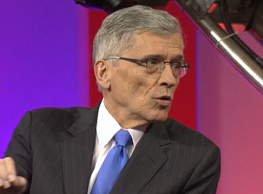INTX 2016: Wheeler Calls 'Regulatory Assault' Charge Lobbying Tactic

The smarter way to stay on top of broadcasting and cable industry. Sign up below
You are now subscribed
Your newsletter sign-up was successful
FCC chairman Tom Wheeler signaled that he thought cable/broadband operators were in danger of standing in the way of progress in their pushback on proposals like set-top box unlocking and special access reforms and that those who do not want to change, or stand in the way of change, are destined to fail.
He signaled those proposals could still be adjusted if the industry was willing to work on getting to yes, but just saying "no" was not the way forward.
Wheeler was being interviewed by C-SPAN senior executive producer Peter Slen for the general session capping the INTX show in Boston.
He said that it was while he was running NCTA that he developed the philosophy about government he still holds today, which is that it needs to step in to insure competition, then get out of the way.
National Cable & Telecommunications Association president Michael Powell, himself a former FCC chair, opened the show accusing the FCC, and by association Wheeler, of a "relentless regulatory assault" on the industry, citing the FCC's proposal to "unlock" set-tops, regulate broadband privacy and potentially regulate cable business broadband rates in markets it deems less than competitive.
Slen brought up that opening salvo, pointing out that Wheeler had an audience that disagreed on a lot of those proposals he was advocating as pro-competition.
But Wheeler essentially dismissed Powell's "assault" rhetoric as a lobbying tactic that, as a former lobbyist, he knew well.
The smarter way to stay on top of broadcasting and cable industry. Sign up below
"Anybody understands the reality of a job like Michael's. You know, I can think back to when I was lobbying chairman Powell and I think that the way in which lobbying campaigns tend to work these days is, first you set up a scenario of 'there's too much being done. We're being persecuted.' Then you talk about what I call 'imaginary horribles,' conceptual things that could happen if they do this or that. And, I am now on the other side receiving this, and you say, 'OK, Wheeler, turnabout's fair play.' But you also understand what's going on."
Wheeler said when he was at NCTA (in the 1970s and 1980s), he was lobbying for an industry that was trying to find a way to innovate, while broadcasters and telephone companies were doing everything they could to stop him.
"We were saying: 'Here's a new opportunity. How do we change the way consumers get information?' And by golly, we sure did."
While Wheeler owned his own lobbying past, he suggested it was in the cause he still espouses. "Those who try to stop the change always fail. I don't mean most of the time."
He did not explicitly draw the parallel with what he clearly sees as a cable/broadband industry in the role of obstructionist, but his message was clear and easy to hear as it echoed in a quiet hall—there were no applause lines or applause.
Wheeler said it was incumbent on both the regulator and regulated to "deal with finding solutions, not just slogans."
The chairman said they were in a "make or break" period on issues like set-tops and special access or "any of the other issues on which there is some tension." (That would include broadband privacy.) He basically gave his audience a choice between "are you going to say no and do everything possible, or are you going to say: 'How are we going to make this work for consumers first?'"
He also said there was still a chance to get to yes on those proposals, neither which is going to be the finished product, though he added with emphasis "there is going to be a finished product." At a Tuesday panel session at the show, Republican commissioner Michael O'Rielly said the set-top box product should finish in the garbage.
Wheeler did bring up arguably his most significant pro-cable move—reversing the presumption on effective competition. He pointed out that the effect was to deregulate rate regulation. He also pointed out that was a 3-2 decision where the other two votes were Republican.
He said that was because he believed there was competition in the delivery of video services that no longer warranted that historic rate regulation. So, that was an example of getting out of the way where there was competition, he suggested, then related it to what he was trying to do with set-tops, Open Internet and special access.
He said all of those were about focusing on competition and the government's role "to encourage competition so that government can then step out."
Contributing editor John Eggerton has been an editor and/or writer on media regulation, legislation and policy for over four decades, including covering the FCC, FTC, Congress, the major media trade associations, and the federal courts. In addition to Multichannel News and Broadcasting + Cable, his work has appeared in Radio World, TV Technology, TV Fax, This Week in Consumer Electronics, Variety and the Encyclopedia Britannica.

